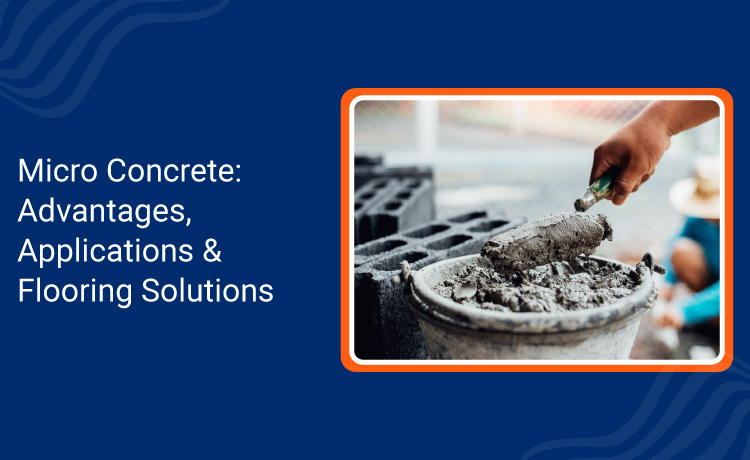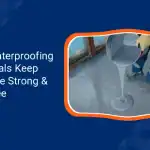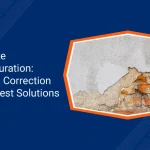 May 27, 2025
May 27, 2025
Micro Concrete is a cement-based pre-packaged mixture widely used in various construction projects. It consists of water-based resins, polymers, additives, and mineral pigments with a high cement ratio. Micro Concrete is known to be the best alternative to traditional concrete. But do you know how?
In this comprehensive blog post, we will explore micro concrete, its advantages, applications, and how it is the best alternative to traditional concrete. We will also learn how to choose and apply it for extended durability and strength.
Micro Concrete comprises specialised additives and polymers with a high cement and low water-to-cement ratio. Its tailored composition provides rapid strength gain and extended durability to the applied surface. Due to its quick mixing time and fast dry time, it is widely popular among various construction projects.
Micro-concrete, also known as self-compacting concrete (SCC), is designed to offer self-compacting nature due to specific admixtures addition. It doesn’t require any manual compaction tool for vibration during placement, as it has self-weight and high flowability. So, compared to traditional concrete, it offers easy application and thus saves time and effort.
Micro concrete expands in both plastic and hardened states, offsetting shrinkage and cracking. In addition, it is known for its low shrinkage, high adhesion, and cracking resistance properties, even in high traffic and environmental stress. Due to its dual expansion and cracking resistance properties, it become an indispensable concrete composition for repairing RCC (Reinforced Cement Concrete) and formwork structures.
Due to its unique composition and application process, it exhibits excellent bonding capability to various surfaces, whether wood, tiles, or existing concrete surfaces. Its pre-mix formulation and low water requirements allow it to achieve reliable and durable bonding to different constructional substrates. In addition, due to its excellent bonding capability, micro concrete is widely used for surface overlays and repairs.
Compared to traditional concrete, micro concrete offers rapid setting time, making it suitable for those construction projects where time is critical. Its fast curing time, easy application, self-compaction, and pre-packaged mix solution heavily cut the downtime required for preparing and fixing traditional concrete solutions.
Micro concrete is widely used for flooring residential and commercial spaces, such as homes, offices, and retail, due to its high-traffic handling capability, durability, and low maintenance. Its smooth and even surface finish enhances flooring aesthetics and makes the floor more modern and attractive. The non-slippery micro concrete application allows travellers to make a grip over the floor and thus mitigates any possibility of falling due to slipping.
Due to its high strength, flowability, ease of application, and durability, micro concrete is widely used for repair and restoration. It strengthens deteriorating columns, beams, and slabs. Micro concrete is also used to repair and restore high-load structures like bridges and skyscrapers. Besides, due to its high strength and smooth finish capabilities, it is used to preserve historical architecture, heritage, and monuments.
First, define the purpose of using micro concrete. Is it for repairing structural elements, flooring, or purely decorative finishes? Structural repairs demand high-strength variants, while decorative construction requires aesthetics and finish quality. Such flooring applications may require micro concrete with high abrasion resistance. Identifying the right application ensures you choose a product that matches your functional and visual expectations.
Micro concrete comes in different grades to meet specific load-bearing requirements. Select high-compressive strength micro concrete for structural repairs, especially columns, beams, or load-bearing walls. For cosmetic or light-duty applications, a lower strength grade would be suitable. Always match the concrete’s strength to your project’s structural demands to avoid premature failure or reduced performance.
The required thickness impacts both the type and quantity of micro concrete. Thin layers are ideal for decorative finishes, while thicker applications are necessary for structural reinforcement. So, determine how thick a layer you need to apply and always calculate surface area and thickness to estimate the total volume and ensure consistent coverage.
Outdoor environments demand micro concrete that withstands temperature changes, UV exposure, and moisture. Indoor use requires micro concrete with a smooth finish and aesthetically pleasing properties. Also, check for resistance to chemicals or water if used in industrial or bathroom settings. Environmental compatibility ensures durability and long-term performance.
Choose reputable brands known for consistent quality and compliance with construction standards. Certified products usually offer better workability, strength, and finish. Avoid low-cost alternatives that may compromise performance. Quality assurance reduces repair frequency and improves long-term cost-effectiveness.
Clean the surface thoroughly to remove dust, grease, oil, loose particles, or contaminants. For structural applications, chisel out weak concrete until you reach sound material. A roughened, clean surface promotes better bonding. Inadequate surface preparation can result in delamination or poor adhesion of the micro concrete.
After cleaning, apply a suitable bonding agent or primer. This step is crucial to ensure adhesion between the old substrate and the new micro concrete. Use a brush or roller for even coverage, and allow the primer to become tacky before application for optimal results.
Always follow the manufacturer’s instructions while mixing. Use clean water and a mechanical mixer to achieve a uniform, lump-free mix. Ensure the mixture is not too watery or too dry, as consistency is key here. Improper mixing can lead to weak spots or cracking after application.
Depending on the area and finish needed, you can apply micro concrete using a trowel by spraying or pouring and levelling it. For decorative finishes, hand troweling is best. For larger surfaces, pouring and levelling ensure uniformity. Spray application suits uneven or vertical surfaces. Choose the method based on project scope and finish expectations.
Curing is vital for strength development. Keep the surface moist for at least 3–7 days post-application. Use wet hessian cloths, plastic sheets, or a curing compound. Premature drying can lead to cracking or low strength, so avoid exposing fresh concrete to direct sun or wind.
After curing, apply a sealant to protect the surface from moisture, stains, and wear. This step enhances durability and longevity. Choose a matte, satin, or glossy finish based on aesthetic needs. Sealing also makes the surface easier to clean and maintain over time.
Micro concrete is a versatile prepackaged mixture infused with high strength and durability. it offers rapid setting time, reduces downtime, provides excellent bonding capability to different surfaces, and leaves an aesthetically pleasing surface post-application. Follow the selection and application steps to ensure extended durability, strength, and smooth finish.
MCON Rasayan, a top construction chemical manufacturer in India, offers micro concrete premix composition loaded with high strength, rapid setting time, excellent bonding ability, and crack resistance properties. We are sought after for our cost-effectiveness and reliable construction products. Contact us today!

Dr Rachna Pandey is an honourable vice president of MCON Rasayan and holds a Ph.D. degree in chemistry. She has played a leading role in transforming the quality of our products with her magnificent 18+ years of experience in R&D and QA/QC. She is the one behind MCON’s international-grade construction products, all because of her proven expertise in innovation, strategy execution, and technical knowledge.




